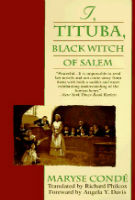 At the age of seven, Tituba watched as her mother was hanged for daring to wound a plantation owner who tried to rape her. She was raised from then on by Mama Yaya, a gifted woman who shared with her the secrets of healing and magic. But it was Tituba’s love of the enslaved John Indian that led her from safety into the Maafa (slavery), and the bitter, vengeful religion practiced by the good citizens of Salem, Massachusetts. Though protected by the spirits, Tituba could not escape the lies and accusations of that hysterical time.
At the age of seven, Tituba watched as her mother was hanged for daring to wound a plantation owner who tried to rape her. She was raised from then on by Mama Yaya, a gifted woman who shared with her the secrets of healing and magic. But it was Tituba’s love of the enslaved John Indian that led her from safety into the Maafa (slavery), and the bitter, vengeful religion practiced by the good citizens of Salem, Massachusetts. Though protected by the spirits, Tituba could not escape the lies and accusations of that hysterical time.
As history and fantasy merge, Maryse Conde, acclaimed author of Tree Of Life and Segu, creates the richly imagined life of a fascinating woman.
Reviews: I, Tituba, Black Witch of Salem
” The author of the highly recommended intergenerational saga Tree of Life (Fiction Forecasts, June 29) moves from her native Guadeloupe to colonial New England in this potent novel. Revising the legend of a slave woman accused of practicing witchcraft and imprisoned in Salem, Mass., in 1692, Conde freely imagines Tituba’s childhood and old age, endows her with what Davis calls a contemporary social consciousness, and allows her to narrate the tale. Her pointedly political story indicts the Puritans’ racism and hypocrisy and their contemporary manifestations. Conceived when an English sailor rapes an Ashanti captive on the slave ship Christ the King , Tituba grows up in Barbados but follows her beloved, John Indian, into servitude in America when he is sold to minister Samuel Parris. Charged with witchcraft when she heals Parris’s wife and daughters, she shares a jail cell with Hester Prynne, who helps her plan her testimony before the Salem judges. Eventually reprieved, Tituba is bought by a Jew, himself persecuted, who frees her and gives her passage to Barbados. At once playful and searing, Conde’s work critiques ostensibly white, male versions of history and literature by appropriating them.” –Publishers Weekly
“In 1692, a Barbadian enslaved woman named Tituba was arrested for witchcraft in Salem, Massachusetts. From this historical fact, Conde, an acclaimed writer from Guadeloupe, invents Tituba’s life story from childhood to old age. As a child, Tituba sees her mother executed. She is then raised by an old woman who teaches her the African art of healing and communicating with spirits. As a young woman, she is sold to a Puritan minister who leaves Barbados for America. Tituba uses her powers for good purposes, including the healing of her master’s family. But her powers are misunderstood by the narrow-minded Puritans, who can only associate witchcraft and the blackness of her skin with evil. Far more than an historical novel, Conde’s book makes a powerful social statement about hypocrisy, racial injustice, and feminism through the use of postmodern irony. With a foreword by Angela Davis. Highly recommended.” – Joanne Snapp, Library Journal
Submit your review | |


